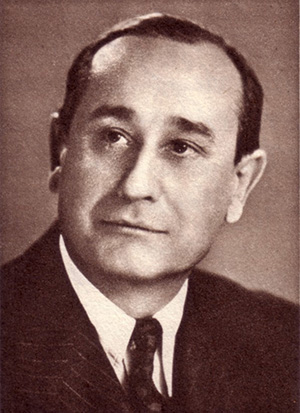Lewis Webster Jones

Lewis Webster Jones: 1947-1951
After 40 years of presidents with strong ties to the University of Arkansas, the Board of Trustees looked beyond the state and hired Lewis W. Jones on the university’s 75th anniversary to give a fresh look at the university. Jones had earned a bachelor’s degree from Reed College and a doctoral degree from the Brookings Graduate School of Economics and Government. He also did post-graduate work at Columbia, the London School of Economics, Cambridge and the University of Geneva. He was president of Bennington College in Vermont when hired by the university.
He brought new ideas and energy to the university. The two largest projects completed during his tenure were creation of an integrated Fine Arts Center, in which the visual and performing arts would have cross collaboration, and building of a Medical Center at Little Rock for the university’s School of Medicine. The University of Arkansas also became integrated during Jones’ administration when Silas H. Hunt enrolled in the School of Law.
Graduate work at the university had been limited to master’s degrees, but was expanded to include doctoral degrees in philosophy and education. New buildings for the physics department and law school were constructed. Residential halls were added. The journalism department and a printing shop were combined into Hill Hall. The College of Education’s curriculum was completely revamped to create a four-year program in which students would learn general subjects and then devote a fifth year to graduate credit, supervised practice teaching and study of teaching pedagogy.
Jones left in 1951 to become president of Rutgers University and left that position in 1958 to become president of the National Conference on Christians and Jews.
Personal: Jones was born at Emerson, Neb., in 1899 but grew up in Portland, Ore. He married Barbara Slatter, and they had two children. He died Sept. 10, 1975, in Sarasota, Fla.
Quote from Jones upon his installment as president: “We must find some way of bringing liberal and vocational studies into continuing inter-relationship so that they interact and enrich one another and have genuine meaning for the student at every stage. We can’t separate knowing from doing, or knowledge from persons. Liberal training, if properly conceived, is an attitude, a moral and humane approach to all knowledge, affecting people’s lives and work; it is not something separate, academic and remote; and it is in the highest degree useful.”
Chancellors
- 2022-Present Charles F. Robinson
- 2016-2021 Joseph E. Steinmetz
- 2008- 2015 G. David Gearhart
- 1997- 2008 John A. White
- 1986-97 Daniel Ferritor
- 1984-85 Willard Gatewood
- 1982-83 B.A. Nugent
Presidents
- 2025-Present Jay B. Silveria
- 2011-2025 Donald R. Bobbitt
- 1990-2011 B. Alan Sugg
- 1984-90 Ray Thornton
- 1980-84 James E. Martin
- 1974-80 Charles E. Bishop
- 1960-74 David Wiley Mullins
- 1952-59 John Tyler Caldwell
- 1947-51 Lewis Webster Jones
- 1941-47 Arthur M. Harding
- 1939-41 J. William Fulbright
- 1913-39 John C. Futrall
- 1905-12 John N. Tillman
- 1902-05 Henry S. Hartzog
- 1894-1902 John L. Buchanan
- 1887-94 Edward H. Murfee
- 1884-87 George M. Edgar
- 1877-84 Daniel H. Hill
- 1873-75 Albert W. Bishop
- 1871-73 Noah P. Gates